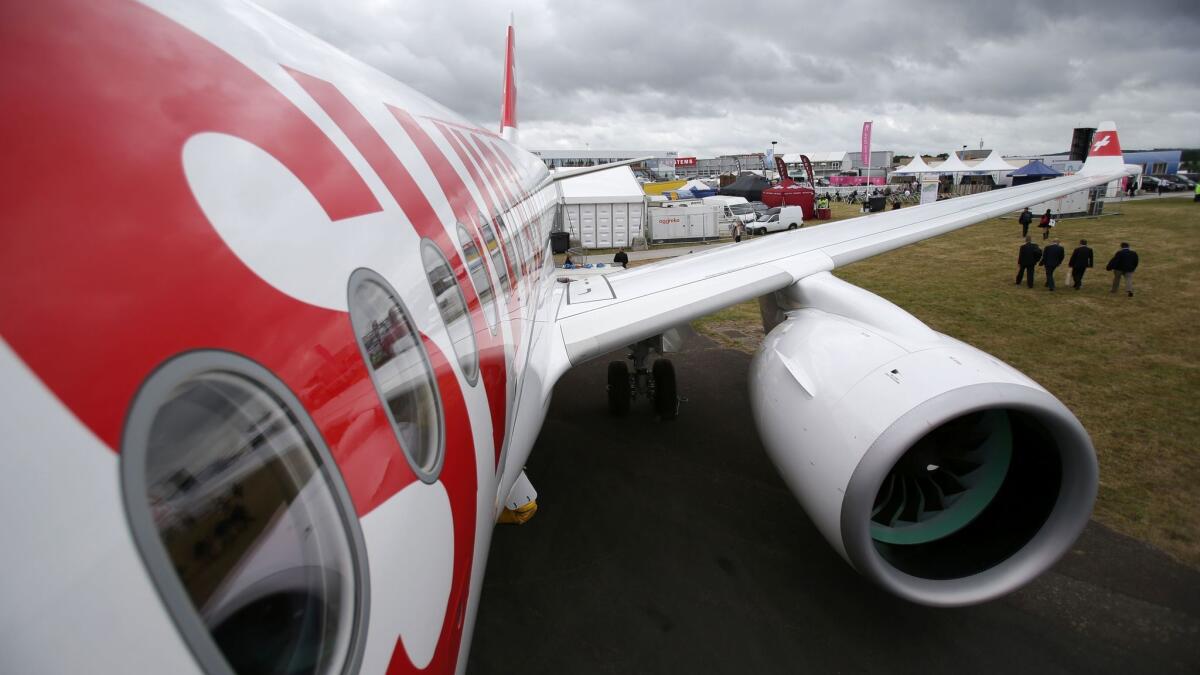U.S. moves to impose tariffs of as much as 219% on Canadian jet maker, siding with Boeing

- Share via
The U.S. government moved to impose tariffs on Canadian jetliners Tuesday when it ruled in favor of a complaint by U.S. aircraft maker Boeing that accused rival Bombardier of receiving unfair government subsidies.
The Commerce Department suggested the tariffs could be as high as 219%. The action threatens to further inflame trade tensions between the two North American neighbors. This year, the Commerce Department moved to impose new duties on the import of Canadian soft lumber and President Trump has signaled his interest in renegotiating the terms of the North America Free Trade Agreement between the two nations.
Bombardier has sold aircraft to U.S. carriers for decades. But Boeing’s complaint follows a multibillion-dollar deal struck between Bombardier and Atlanta-based Delta Air Lines for 75 C-series CS-100’s, a commercial airplane that seats about 100 people.
After the deal, Boeing formally asked the U.S. Commerce Department to investigate what it called illegal government subsidies and unfair pricing practices that have allegedly given the Canadian company an unfair advantage as it competes for business in the United States.
“Without bailout money from Ottawa and the Quebec provincial government [Bombardier] would probably be bankrupt,” said Loren Thompson, a defense consultant whose think tank gets funding from Boeing. “What Boeing is really saying here is that Bombardier has an unfair advantage because Canadian taxpayers are covering part of its cost.”
Bombardier is slated to begin delivering the planes next year, and any new duties imposed by the Commerce Department would increase the cost of the order to the aircraft manufacturer. The exact amount of any new tariffs would probably not be finalized until early next year. Even then, Canada could pursue a case against the United States at the World Trade Organization.
An ultimate decision to impose tariffs could also have ripples in Northern Ireland, where Bombardier employs about 4,000 people.
This is a dangerous moment for Boeing.
— Richard Aboulafia, Teal Group
The Trump administration did not take an official position on the matter before Tuesday evening’s trade decision. But British and Canadian leaders have publicly urged the Trump administration not to impose tariffs.
The Guardian reported this month that British Prime Minister Theresa May raised the issue privately with President Trump following political pressure in the United Kingdom. And Canadian Prime Minister Justin Trudeau suggested this month that his government might retaliate directly against Boeing through decisions on military purchasing agreements. The Canadian military is considering whether to buy Boeing’s F-18 Super Hornets for the Canadian military, and Trudeau suggested in a Sept. 18 news conference that he would abandon the purchase as a result of Boeing’s complaint against Bombardier.
“We won’t do business with a company that’s busy trying to sue us and put our aerospace workers out of business,” Trudeau said in the news conference.
Some have questioned why Boeing would wade into international geopolitics in the first place. Richard Aboulafia, an aerospace industry analyst at Teal Group, described Boeing’s action as a “self-inflicted wound” that could damage the company’s business relationships with the Canadian military and with Delta.
“This is a dangerous moment for Boeing,” Aboulafia said. “They clearly saw this as an opportunity to walk in lockstep with Donald Trump and appeal to his nationalist economic base.”
Bombardier has been frank in its criticism of Boeing’s suit. In a Sept. 18 statement titled “Boeing’s Hypocrisy,” Bombardier criticized the company’s trade practices abroad and urged the U.S. Commerce Department to reject its bid.
“Boeing’s self-serving actions threaten thousands of aerospace jobs around the world, including thousands of U.K. and U.S. jobs and billions of purchases from the many U.K. and U.S. suppliers who build components for” Bombardier’s plane, the company’s statement said. “The U.S. government should reject Boeing’s attempt to tilt the playing field in its favor.”
Boeing hailed the Commerce Department decision in a statement.
“Global trade works only if everyone plays by the rules that we’ve all endorsed to ensure fair competition, as adjudicated by independent national and international bodies,” Boeing said. “This dispute has nothing to do with limiting innovation or competition, which we welcome. Rather, it has everything to do with maintaining a level playing field and ensuring that aerospace companies abide by trade agreements.”
The move follows another trade dispute between the United States and its northern neighbor. For years, the United States lumber industry had complained that because Canadian lumber is subsidized by the government, the imports make it difficult for U.S. companies to compete. Over the summer, the Trump administration called for tariffs on imports of softwood lumber. Commerce Secretary Wilbur Ross said at the time that he was hopeful the countries would be able to “reach a negotiated solution,” and the Commerce Department recently announced a delay in proceedings to work one out.
Still, the Trump administration has generally taken a one-on-one stance toward trade, threatening to remove the United States from multinational, regional accords such as NAFTA. But that has received pushback, including from Thomas Donohue, president of the U.S. Chamber of Commerce, who wrote in an op-ed in the Wall Street Journal this week that, “quitting NAFTA would be an economic, political and national-security disaster.”
More to Read
Inside the business of entertainment
The Wide Shot brings you news, analysis and insights on everything from streaming wars to production — and what it all means for the future.
You may occasionally receive promotional content from the Los Angeles Times.







